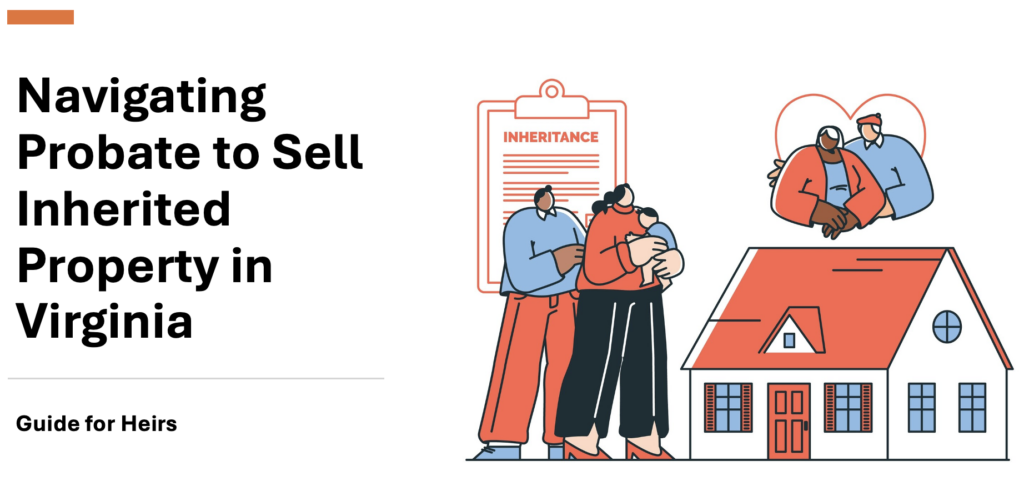Inheriting a home can be both a blessing and a challenge. While it may provide financial opportunities, it also comes with responsibilities, including maintenance, legal processes, and taxes. For many, the decision to sell the inherited property is the most practical route, but understanding the tax implications is crucial to making an informed choice.
Fortunately, tax laws have been structured in a way that eases the burden on those inheriting property. In most cases, selling an inherited home is far less financially daunting than one might expect. Whether you’re looking to sell the property quickly or considering your long-term options, knowing how taxation works will help you make the best decision.

🚀 Want a step-by-step guide on navigating probate and selling an inherited home? Download Our Free Probate Guide Now!
Fortunately, tax laws have been structured in a way that eases the burden on those inheriting property. In most cases, selling an inherited home is far less financially daunting than one might expect. Whether you’re looking to sell the property quickly or considering your long-term options, knowing how taxation works will help you make the best decision.
Understanding the Basis of an Inherited Property in Virginia
One of the most important concepts in real estate taxation is the “basis” of a property. The basis is essentially the property’s value for tax purposes, which affects how much gain or loss you recognize when you sell it.
When you inherit a home, the basis is adjusted to the property’s fair market value at the time of the original owner’s death. This is known as a stepped-up basis, and it significantly benefits heirs by reducing potential capital gains taxes. For instance, if your loved one purchased the home decades ago for $50,000 and its market value at the time of their passing was $300,000, the new basis for tax purposes would be $300,000.
This stepped-up basis is crucial because it means that if you sell the home soon after inheriting it, your taxable gain will be minimal, assuming the sale price is close to the new market value.
Get Your Free Probate Guide!
Download our comprehensive guide, “Navigating Probate to Sell Inherited Property” and gain:
✅ Step-by-step instructions
✅ Links to essential forms and resources
✅ Pro tips for a smooth property sale
✅ Clear timelines and next steps

Capital Gains Tax on Inherited Property in Virginia
When you sell an inherited home, any profit from the sale is categorized as a capital gain. Capital gains tax applies when you sell a property for more than its basis. However, because of the stepped-up basis, you are only taxed on the increase in value from the date of inheritance, not from the time the deceased originally purchased it.
Short-Term vs. Long-Term Capital Gains
Typically, capital gains are classified as either short-term or long-term based on how long you hold an asset before selling it. However, with inherited property, any gains are automatically considered long-term, regardless of when the sale occurs. This is beneficial because long-term capital gains are taxed at a lower rate than short-term gains, which are taxed at the ordinary income tax rate.
The current long-term capital gains tax rates vary based on your income level, but they typically range from 0%, 15%, or 20%, depending on your taxable income.
📘 Confused about the stepped-up basis? Our probate guide explains it in simple terms. Grab your free copy today!
Reporting the Sale of an Inherited Home
Once the inherited property is sold, you must report the transaction to the IRS. Here’s how the reporting process generally works:
1. Determine the Capital Gain or Loss: This is done by subtracting the stepped-up basis from the final sale price. For example, if your inherited home had a stepped-up basis of $300,000 and you sell it for $320,000, you will have a taxable capital gain of $20,000.
2. Report the Sale on Your Tax Return: You must include the transaction on Schedule D (Capital Gains and Losses) of your federal tax return.
3. Pay Capital Gains Tax (If Applicable): Depending on your income bracket and how much you gained from the sale, you may owe capital gains tax.
If the property sells for less than the stepped-up basis, you may be able to claim a capital loss, which can offset other taxable income in some cases.
✅ Stay ahead of tax surprises! Download our comprehensive probate guide to learn how to reduce your tax liability. Get it now!
Estate Taxes and Inherited Property
Most inherited properties are not subject to federal estate taxes unless the total estate value exceeds the estate tax exemption limit. As of recent years, the federal estate tax exemption is quite high—over $12 million. This means that most inherited homes won’t trigger estate taxes, though state estate taxes may vary.
If you inherit a property and then choose to sell it, you typically won’t have to worry about estate taxes, but it’s always advisable to check both federal and state laws, especially if the total estate’s value is substantial.
📄 Want to make sure you report everything correctly? Our probate guide includes a tax reporting checklist. Download it free!
The Probate Process and Selling an Inherited Home
Before selling an inherited home, you may need to go through probate, a legal process where the deceased’s estate is settled. If the property was left to you through a living trust or as a joint owner with rights of survivorship, probate may not be necessary. Otherwise, the court will oversee the transfer of the property to the rightful heirs before any sale can occur.
During probate, the court ensures all debts and taxes owed by the estate are settled. If multiple heirs inherit the property, they must all agree to the sale, or legal action may be required to force a sale (known as partition action).
📊 Not sure if estate taxes apply to you? Our free guide can clarify things. Download your copy today!
Should You Sell the Inherited Property?
Deciding whether to sell an inherited property depends on several factors, including financial needs, emotional attachment, and tax implications. Here are some key considerations:
1. Market Conditions: If real estate prices are strong in Virginia, selling could yield a high return.
2. Maintenance Costs: Holding onto a property requires paying for upkeep, property taxes, and insurance.
3. Emotional Attachment: Some heirs prefer to keep the home as a rental or vacation property rather than selling it immediately.
4. Financial Obligations: If there’s an outstanding mortgage, selling might be necessary to avoid financial strain.
🏡 Still weighing your options? Our probate guide helps you decide what’s best for you. Download it here!
Selling the Property Quickly
If you decide to sell, there are several ways to expedite the process:
Sell to an Investor: Real estate investors can often make cash offers and close deals quickly, bypassing lengthy traditional sales processes.
List with a Real Estate Agent: A knowledgeable agent familiar with the local market can help get top dollar for the property.
Direct Sale to a Family Member or Tenant: If someone already occupying the home is interested in purchasing it, this can be a smooth and quick transaction.
💡 Make probate easier! Our guide walks you through the entire process with simple steps. Get your free probate guide now!
Final Thoughts
Inheriting a home can be overwhelming, but with the right approach, it can also be a valuable financial opportunity. Understanding the tax consequences and following the proper legal steps can make the process much smoother. Whether you choose to sell, rent, or keep the property, making an informed decision will help you get the most out of your inheritance.
If you have further questions about selling an inherited home in Virginia, feel free to reach out. We’d be happy to assist you in navigating this process and ensuring you make the best decision for your situation.
📞 Need expert advice fast? Download our probate guide or contact us directly for personalized help. Grab the guide now!
Get Your Free Probate Guide!
Download our comprehensive guide, “Navigating Probate to Sell Inherited Property” and gain:
✅ Step-by-step instructions
✅ Links to essential forms and resources
✅ Pro tips for a smooth property sale
✅ Clear timelines and next steps

